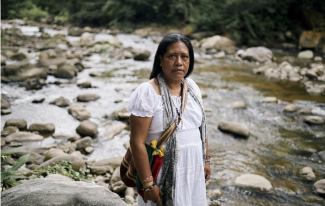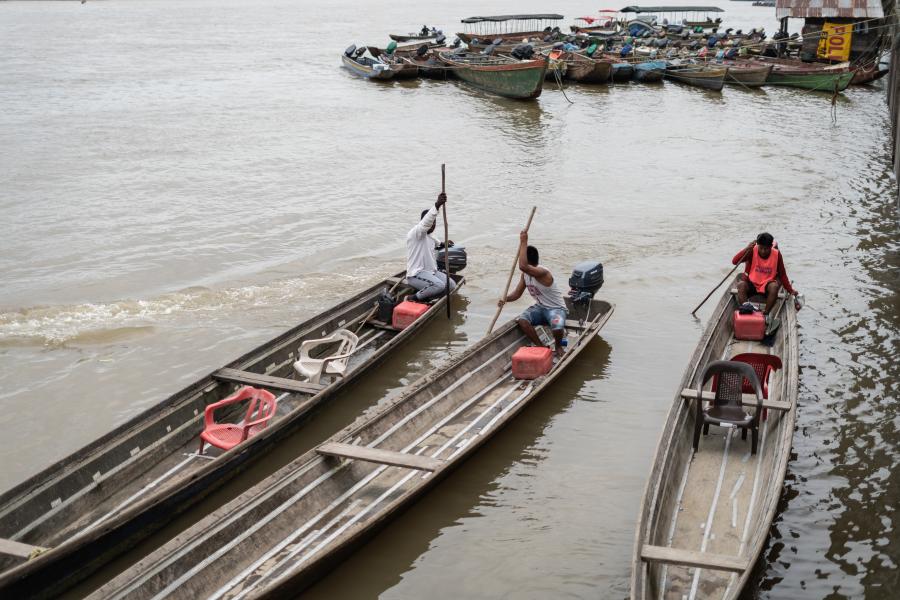Population figures | 2021 - 2025
2025 situation overview
By mid-2024, Colombia recorded almost 7 million internally displaced people (IDPs), all of whom the Government has recognized as eligible for assistance and reparations. According to UNHCR’s 2024 Mid-Year Trends report, forced displacement continues to affect Colombia, with one of the largest numbers of IDPs and increasing new asylum applications filed by its nationals abroad.
Since the signing of the 2016 Peace Agreement, over 1.4 million new displacements have been registered within Colombia as of August 2024, an annual average of 180,000 new IDPs. In 2023, more than 278,000 people were displaced, while in the first half of 2024, more than 95,000 people were affected by violence, large-scale displacements, and confinements. The Government's Total Peace initiative, a key pillar of its agenda, is now at a delicate juncture with the announcement in September 2024 of a pause in the peace talks with the National Liberation Army (ELN) following an attack on a military base in Arauca. Meanwhile, armed clashes among non-state armed groups who compete for territorial and social control continue to affect vulnerable communities, leading to displacement and confinement in regions such as Nariño and Cauca. This escalation, which has begun affecting new areas, underscores the urgent need for peace negotiations with various groups to translate into protection space for civilians.
The internal situation in Colombia has spillover effects in neighbouring countries such as Ecuador, facing its own deteriorating security situation and spiralling violence, and where Colombians have steadily sought asylum over the years. The United States of America and Spain have been the primary recipients of Colombian asylum applications in 2023 and 2024. In 2023 and 2024, UNHCR has observed an increasing trend in asylum claims from Colombians. As of mid-2024, 116,800 new asylum claims had been submitted, an increase of 18% compared to the first half of 2023, reflecting the dire circumstances that have forced many Colombians to flee and their need for international protection as refugees. Moreover, in 2023, more than 18,800 Colombians crossed the Darien jungle heading northwards, while in 2024 as of 30 September more than 14,900 had crossed, representing 6% of the mixed movements arriving in Panama, and the second largest nationality making this treacherous journey.
In 2025, in line with the Colombian Government's priorities, UNHCR will step up its support towards solutions for IDPs, including the regularization of informal urban settlements, and the restitution of land, as well as the efficient implementation of the existing legal framework for solutions including return, relocation and local integration, access to truth, justice, and reparation rights. UNHCR expects to reach 52,000 IDPs through comprehensive solutions processes in 2025, emphasizing the promotion of institutional presence in areas and including legal, technical, social and urban planning components.
UNHCR will work within the framework of the Secretary-General’s Action Agenda on Internal Displacement and in the inter-agency Solutions Steering Group and the Internal Displacement Solutions Fund (IDSF), together with UNDP, IOM and UN-Habitat, to support the Government in designing and implementing a long-term solutions policy instrument, including progress indicators and a funding strategy.
At the same time, UNHCR will help enhance the capacity of local authorities to prevent and respond to humanitarian emergencies with more robust early warning systems for better monitoring and a timelier response, as well as improving shelter support. UNHCR will also support the reintegration of Colombian returnees who often struggle to fully recover their rights.
To maximize resource efficiency, UNHCR adopts an area-based approach (ABA) in locations where the needs of IDPs and Colombian returnees coincide with those of Venezuelan refugees and migrants, or mixed population flows. The ABA focuses on addressing the needs of communities, both displaced and hosting, within specific geographical areas, emphasizing local participation and integration of diverse sectors such as health, shelter, and livelihoods. It aims to provide a coordinated response that acknowledges local capacities and resources, enabling more effective, sustainable, and context-driven solutions to humanitarian challenges.
In countries hosting Colombians where UNHCR has an operational response, such as Argentina, Chile, Ecuador, Panama and Peru, UNHCR will collaborate with partners and national and local governments to deliver protection and solutions to refugees through an ABA. Additionally, UNHCR will continue facilitating access to asylum procedures for Colombians in need of international protection. UNHCR and partners will strengthen and support the local integration of refugees through peaceful coexistence projects that enhance their socioeconomic inclusion.
Financial overview
Indigenous leader takes her people’s fight for survival to biodiversity summit
By Johnny Meneses and Biel Calderón in Serranía del Perijá, Colombia
Born in the Sokorpa reserve in Colombia – one of several communities inhabited by the roughly 15,000 Yukpa people – Esneda's activism was shaped from a young age by her mother, a traditional Yukpa authority. “I was always by her side as a child. I became a leader because it was necessary,” she recalled. “I was born to defend our land and people.”
Read the story










